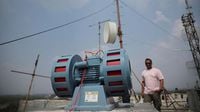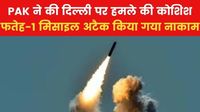In a dramatic escalation of tensions between India and Pakistan, a missile attack aimed at New Delhi was thwarted early Saturday morning, May 10, 2025. Pakistani forces attempted to launch a Fatah-2 missile towards the Indian capital, but the Indian Air Defence System successfully intercepted and destroyed the missile over Sirsa, Haryana, approximately 200 kilometers from Delhi. This incident marks a significant moment in the ongoing conflict, with both nations engaged in a series of retaliatory strikes.
According to reports, the missile was directed towards a strategic location in Delhi as part of Pakistan's Operation Bunyan ul Marsus, which aims to target various sites across India in response to ongoing military actions by India. The Indian Army has been actively conducting operations against Pakistani positions, causing considerable damage to their military infrastructure. In retaliation, Pakistan has resorted to missile and drone attacks, attempting to strike back at Indian military installations.
Indian officials confirmed that the Fatah-2 missile was intercepted before it could reach its target. "Delhi is now completely safe," stated a government source. The successful interception has been attributed to India's robust air defense capabilities, which have been on high alert amid increasing hostilities. In addition to the missile attack, Pakistani forces have been reported to have launched drone strikes targeting various locations in Jammu and Kashmir, Punjab, and Rajasthan, all of which were neutralized by Indian forces.
Colonel Sofia Qureshi, during a press briefing, emphasized that Pakistan's claims of inflicting damage on Indian air defense systems, particularly the S-400, are unfounded. She stated, "The S-400 damage claims are false. Pakistan is engaging in provocative actions, primarily targeting civilians." This assertion comes in light of the continuous bombardment from across the Line of Control (LoC), which has led to civilian casualties and significant property damage in regions like Rajouri.
The situation has prompted heightened security measures in Delhi, where authorities have installed air raid sirens and increased police presence at key installations. Civil defense personnel are being deployed, and mock drills are being conducted to prepare for potential emergencies. Delhi’s Public Works Department minister, Parvesh Verma, announced that 40 to 50 sirens would be installed atop high-rise buildings across the city, ready to be activated in case of an emergency.
As the conflict escalates, the Indian Army has also launched counter-offensives, destroying several Pakistani military installations. Reports indicate that three Pakistani airbases—Noor Khan Air Base in Rawalpindi, PAF Rafiqui Air Base in Shorkot, and PAF Murid Air Base in Chakwal—have suffered significant damage due to Indian strikes. The Pakistani military has acknowledged these attacks, confirming that their airbases were targeted.
On the ground, civilians in border areas are experiencing the brunt of the conflict, with heavy artillery fire reported in Rajouri, where several homes have been damaged, and at least one civilian, Raj Kumar Thapa, an additional district development commissioner, has been killed. Local residents are expressing their concerns about the ongoing violence, with many calling for a de-escalation of tensions.
In the wake of these developments, Prime Minister Modi convened a meeting with defense officials and military leaders to assess the current security situation. The meeting focused on reviewing the preparedness of Indian forces and strategizing responses to Pakistan's aggressive maneuvers. Modi's administration has reiterated that any acts of aggression from Pakistan will be met with a decisive response.
Meanwhile, the international community is closely monitoring the situation. The United States has urged both nations to exercise restraint, emphasizing that it will not intervene in what it considers a regional dispute. Vice President J.D. Vance stated, "While we cannot control the actions of India and Pakistan, we can encourage them to de-escalate tensions."
As the situation remains fluid, it is clear that both nations are on high alert, and the potential for further conflict looms large. The Indian government has also temporarily closed 32 airports across northern and western India for civilian flights until May 15, 2025, as a precautionary measure amid the ongoing hostilities.
In conclusion, the missile attack on Delhi and subsequent military actions underscore the precarious state of relations between India and Pakistan. As both nations prepare for potential further escalations, the impact on civilians living in border regions continues to be a pressing concern, with calls for peace and stability growing louder.





